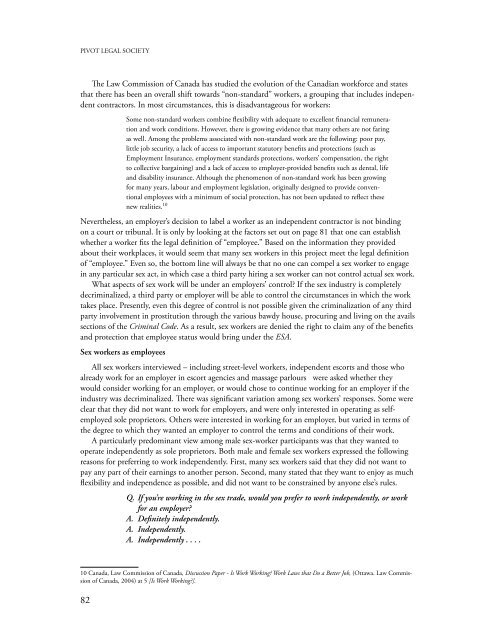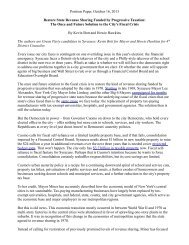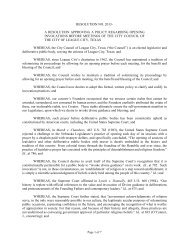Beyond Decriminalization: Sex-work, Human Rights and a New ...
Beyond Decriminalization: Sex-work, Human Rights and a New ...
Beyond Decriminalization: Sex-work, Human Rights and a New ...
- No tags were found...
You also want an ePaper? Increase the reach of your titles
YUMPU automatically turns print PDFs into web optimized ePapers that Google loves.
PIVOT LEGAL SOCIETYThe Law Commission of Canada has studied the evolution of the Canadian <strong>work</strong>force <strong>and</strong> statesthat there has been an overall shift towards “non-st<strong>and</strong>ard” <strong>work</strong>ers, a grouping that includes independentcontractors. In most circumstances, this is disadvantageous for <strong>work</strong>ers:Some non-st<strong>and</strong>ard <strong>work</strong>ers combine flexibility with adequate to excellent financial remuneration<strong>and</strong> <strong>work</strong> conditions. However, there is growing evidence that many others are not faringas well. Among the problems associated with non-st<strong>and</strong>ard <strong>work</strong> are the following: poor pay,little job security, a lack of access to important statutory benefits <strong>and</strong> protections (such asEmployment Insurance, employment st<strong>and</strong>ards protections, <strong>work</strong>ers’ compensation, the rightto collective bargaining) <strong>and</strong> a lack of access to employer-provided benefits such as dental, life<strong>and</strong> disability insurance. Although the phenomenon of non-st<strong>and</strong>ard <strong>work</strong> has been growingfor many years, labour <strong>and</strong> employment legislation, originally designed to provide conventionalemployees with a minimum of social protection, has not been updated to reflect thesenew realities. 10Nevertheless, an employer’s decision to label a <strong>work</strong>er as an independent contractor is not bindingon a court or tribunal. It is only by looking at the factors set out on page 81 that one can establishwhether a <strong>work</strong>er fits the legal definition of “employee.” Based on the information they providedabout their <strong>work</strong>places, it would seem that many sex <strong>work</strong>ers in this project meet the legal definitionof “employee.” Even so, the bottom line will always be that no one can compel a sex <strong>work</strong>er to engagein any particular sex act, in which case a third party hiring a sex <strong>work</strong>er can not control actual sex <strong>work</strong>.What aspects of sex <strong>work</strong> will be under an employers’ control? If the sex industry is completelydecriminalized, a third party or employer will be able to control the circumstances in which the <strong>work</strong>takes place. Presently, even this degree of control is not possible given the criminalization of any thirdparty involvement in prostitution through the various bawdy house, procuring <strong>and</strong> living on the availssections of the Criminal Code. As a result, sex <strong>work</strong>ers are denied the right to claim any of the benefits<strong>and</strong> protection that employee status would bring under the ESA.<strong>Sex</strong> <strong>work</strong>ers as employeesAll sex <strong>work</strong>ers interviewed – including street-level <strong>work</strong>ers, independent escorts <strong>and</strong> those whoalready <strong>work</strong> for an employer in escort agencies <strong>and</strong> massage parlours were asked whether theywould consider <strong>work</strong>ing for an employer, or would chose to continue <strong>work</strong>ing for an employer if theindustry was decriminalized. There was significant variation among sex <strong>work</strong>ers’ responses. Some wereclear that they did not want to <strong>work</strong> for employers, <strong>and</strong> were only interested in operating as selfemployedsole proprietors. Others were interested in <strong>work</strong>ing for an employer, but varied in terms ofthe degree to which they wanted an employer to control the terms <strong>and</strong> conditions of their <strong>work</strong>.A particularly predominant view among male sex-<strong>work</strong>er participants was that they wanted tooperate independently as sole proprietors. Both male <strong>and</strong> female sex <strong>work</strong>ers expressed the followingreasons for preferring to <strong>work</strong> independently. First, many sex <strong>work</strong>ers said that they did not want topay any part of their earnings to another person. Second, many stated that they want to enjoy as muchflexibility <strong>and</strong> independence as possible, <strong>and</strong> did not want to be constrained by anyone else’s rules.Q. If you’re <strong>work</strong>ing in the sex trade, would you prefer to <strong>work</strong> independently, or <strong>work</strong>for an employer?A. Definitely independently.A. Independently.A. Independently . . . .10 Canada, Law Commission of Canada, Discussion Paper - Is Work Working? Work Laws that Do a Better Job, (Ottawa. Law Commissionof Canada, 2004) at 5 [Is Work Working?].82
















